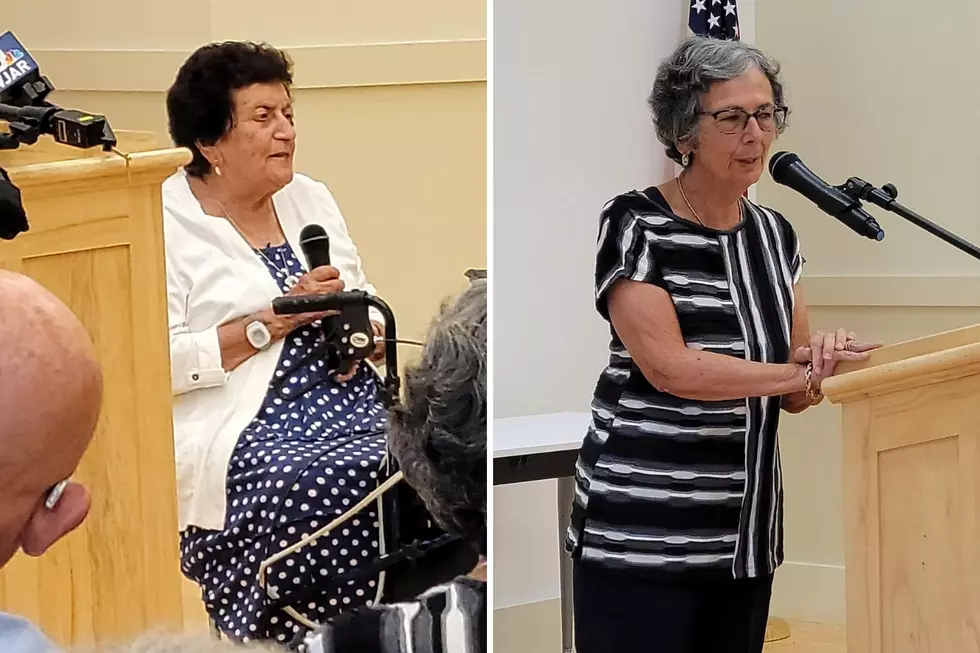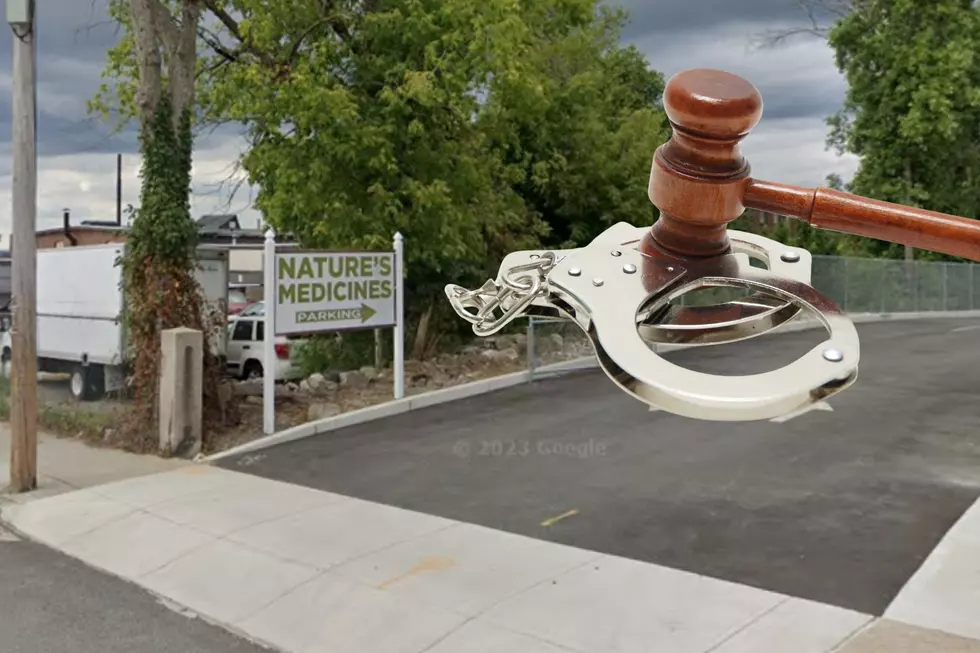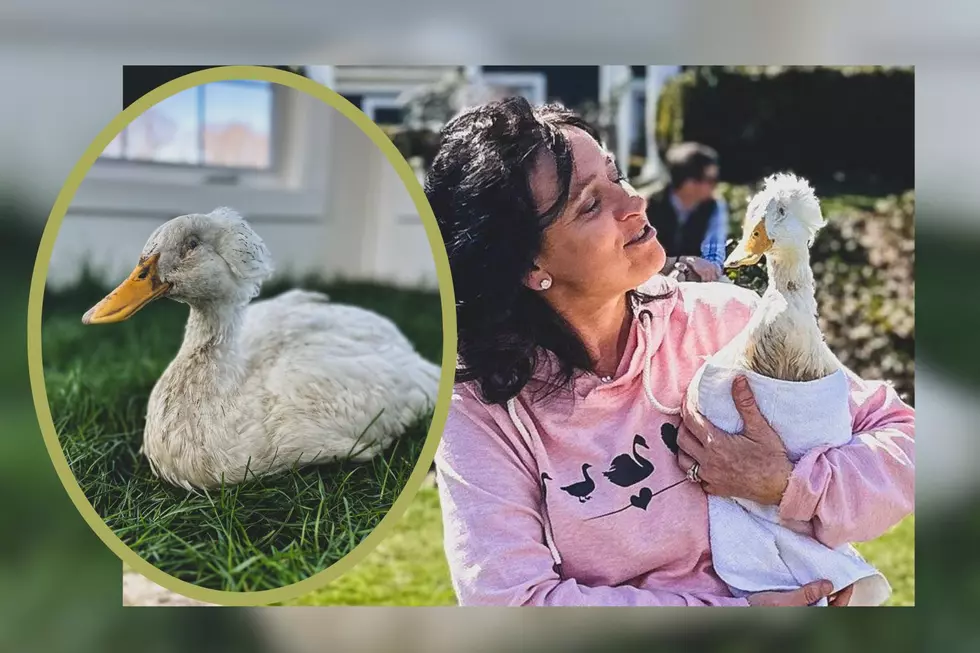
Tiverton Event Offers Holocaust Survival Stories After Restaurant’s Anti-Semitic Controversy
The Tiverton Public Library hosted a special event on Monday evening, featuring stories of survivors of the Holocaust in the wake of a restaurant in town sharing an anti-Semitic meme last month to its Facebook page.
The story of the Atlantic Sports Bar and Restaurant posting a meme featuring a photo of Holocaust victim Anne Frank with the caption “It’s hotter than an oven out there…and I should know!” has gone viral. WBSM was first to break the story just days after the controversial post, but it has since been picked up by national and international news outlets, and even led to Yelp temporarily banning reviews of the Atlantic on its platform.
Even though the restaurant and owner Messias Dias each posted apologies to Facebook – with Dias taking responsibility in a “friends only” post on his personal page and citing ignorance of who Anne Frank was because he dropped out of school at age 13 in order to work – many are not willing to forgive and forget. The more than 50 people in attendance who packed the library’s meeting room Monday evening seemed evidence of that.

State Representative John Edwards, whose district includes Tiverton, hosted the event and was motivated by the Atlantic’s anti-Semitic post.
“When I was reading it, I was thinking, ‘I can’t believe this is happening in Rhode Island,’” Edwards said. “I was embarrassed because I couldn’t believe it was happening in my town and in my district. I was shocked.”
Edwards wrote an op ed column that was published in the Providence Journal and put together Monday’s program.
“I learned a long time ago, and I told my children the same thing, when bad things happen, you can’t be silent,” he said. “Silence is what lets the bad things happen, and it lets the bad things continue to happen.”
Wendy Joering, the Executive Director of the Sandra Bornstein Holocaust Education Center in Providence, introduced the evening’s two featured speakers: 94-year-old Holocaust survivor Alice Eichenbaum and second-generation survivor Lilliane Birch, whose mother was imprisoned at Auschwitz for three years.
“Alice Eichenbaum and Lilliane Birch, you probably don’t know this, but you are two of my heroes,” Joering said. “Admiration and thankfulness doesn’t even begin to describe what I feel for them.”
94-Year-Old Alice Eichenbaum Shares Her Holocaust Survival Story
Eichenbaum referred to herself as “one of the lucky ones” because she was not put in a concentration camp, but she still was sent to live in one of the Jewish ghettos. Born in Vienna, Austria, she grew up in Bulgaria before being deported to the ghetto.
She spoke at length about her husband, Raymond, who was born in Poland and sent to the Lodz ghetto, the second-biggest ghetto behind Warsaw. She spoke of him working nine hours a day in a tannery, making belts for the German soldiers, only to be given a loaf of bread to share with his family.
“After four years in the ghetto, in very inhuman conditions, at age 14 he was sent to Auschwitz,” Eichenbaum said. “By a twist of fate, he was spared from the ovens. He was there not too long, but the two to three months he was there made a hell of an impression he remembered for the rest of his life. He never, never forgot the screams of people, the yelling, the smoke from the chimney and the burning of human flesh.”
Raymond was eventually liberated, but weighed just 55 pounds at the time; the only surviving member of his family, he spent time in orphanages in New York and Chicago before moving into a foster home in Providence. He went on to fight in the Korean War, and then went to college and became a chemist.
“He always said, ‘So Hitler didn’t win, we made something out of us,’” Eichenbaum said.
She said Raymond felt God must’ve spared his life for some purpose, so he dedicated his life to sharing his story and to educate children about the horrors of the Holocaust through the creation of a Holocaust memorial and educational center.
“He said, ‘I have a dream that one day a lot of yellow buses will line up in front of the education center, and we will teach children about what went on in these horrible years of our lives,’” Eichenbaum said. “His dream came true. Hundreds of thousands of children have come through, and we teach them how to be more tolerant, what suffering means, and what years of horrible time he spent.”
She said she took up sharing his story upon his passing, and that she hopes that after she passes away, her sons and her granddaughter will continue on doing the same.
“I hope they’ll continue the work of their father and grandfather and tell people what suffering they went through, and that they should be more tolerant, and understand that we’re all people in this world,” she said.
Lilliane Birch Shares the Story of Her Mother, Anka Nachtigal
Next up was Birch, who shared horrific stories and photos of what her mother endured at Auschwitz right from the very beginning of her journey to the concentration camp.
“They were packed in cattle cars tighter than the proverbial sardines, with no food, no water, no bathrooms,” she said. “The people who were frail and elderly died on the journey, and with no place to lay their bodies, the dead people swayed back and forth amongst the living.”
Birch said an act of kindness earlier in her mother’s life ended up being what saved her life when she arrived at the concentration camp.
“When people arrived at Auschwitz, they were sorted into two lines: the line to live and the line to die,” she said. “My family was put in the line to die.”
However, instead of being ushered into the gas chamber, Anka was stopped by a young woman registering people at a table and handing striped pajamas to the prisoners.
“It turned out she was a girl from my mother’s high school who had been bullied, and my mother had put an end to that and befriended her,” Birch said. “They hadn’t seen each other in about seven years, but when she walked by the woman looked up and said, ‘Anka, is that you? You were the only person who was kind to me in high school and I will not let you die.’”
However, Anka did become a subject of the insane medical experimentation of Dr. Josef Mengele, as he attempted to sterilize young Jewish women.
“He had this great idea that if he could figure out how to sterilize young Jewish women, eventually there would be an end to the Jewish ‘problem,’” Birch said. “He picked my mother to be part of that experiment.”
“She was experimented on with drugs, with injections, with everything Dr. Mengele could think of,” she said. “As a matter of fact, she was told afterward she would never be able to have children, so I’m in my way of being a miracle.”
Birch spoke of the brutality of the Nazi guards, such as when her mother was swaying in the roll call line because of her extreme hunger, and a guard threw a five-gallon can of pain at her, hitting her in the neck. Another time she swayed in line during the winter months, she was forced to take her clothes off and was tied naked to a pole in the freezing cold for 24 hours.
Birch said when she was about nine or 10 years old, her mother began telling her stories of her concentration camp years.
“I asked her what on earth made her survive, and why would she want to live when every day was so incredibly awful,” Birch said. “She said the only ones who survived were the ones who had hope.”
When Birch asked her mother what gave her hope, she recounted two incidents which she said were “virtually miraculous.”
One involved the 100 women living in Anka’s particular barracks being forced to dig a shallow pit, and then stand with their backs to the pit. The guards then picked up their rifles and shot the women as they fell back into the pit.
“And when the dust had settled, 99 of the 100 women were dead. The only one that survived was my mother, and not only was she not killed, she wasn’t even wounded or grazed by a bullet,” Birch said. “The guards were so stunned by this, they just let her go.”
She said another time, she had been trying to sneak loaves of bread to other prisoners when the guards caught her and sicced the attack dogs on her. Anka was convinced it was the end.
“The dogs came up close and stopped, and not a single dog laid a paw on her,” Birch said. “When the guards caught up to the dogs, again, the surprise factor worked in my mother’s favor and they let her go.”
Anka was liberated on January 27, 1945 – her 27th birthday. Despite having developed tuberculosis, Anka and her remaining family members walked from Auschwitz back to Krakow.
Eventually she met and married Birch’s father, and Birch was born when the family was in France attempting to make their way to the United States. Because Anka wouldn’t be allowed into the country with tuberculosis, she used her sister’s x-rays to gain admission into the country, first being sent to Canada before the family finally ended up in the U.S.
Parting Words From U.S. Rep. David Ciccilline
U.S. Congressman David Ciccilline wrapped up the event by again addressing the controversy with the Atlantic Sports Bar and Restaurant.
“Thank you all for being here. This is really a statement about this community and a response to these events,” he said. “I think it’s important to recognize that the Anti-Defamation League found that in 2021, we saw the highest number of anti-Semitic incidents ever recorded since the organization began recording them in 1979 – over 2,700 incidents targeting the Jewish community last year.”
“You think those kinds of things don’t happen in Rhode island, but we had neo-Nazis gathering in February outside the library in Providence, we had the posting of neo-Nazi recruitment flyers last month in East Providence,” he said. “So I think when we have events like this, it’s an opportunity to remind people about the pain, the suffering, and the horror of the Holocaust and the devastation that occurred, but it’s also just a teaching moment for people who may be ignorant and who say horrific, stupid horrible things because they don’t understand how much pain that causes.”
“I think all of us have a responsibility to be kind and respect every single person in our community, to recognize that everyone has value, to recognize that the only thing that can overcome hate is love, and to be a community that is constantly reinforcing that,” he said. “And most of all to be a community that is willing to speak up when you see hate and intolerance and bigotry and racism and anti-Semitism.”
“We all have the responsibility to speak up,” he said. “Silence is the thing that causes those emotions to cause real harm.”
Tiverton Event Offers Holocaust Survival Stories After Restaurant's Anti-Semitic Controversy
LOOK: The oldest cities in America
More From WBSM-AM/AM 1420









